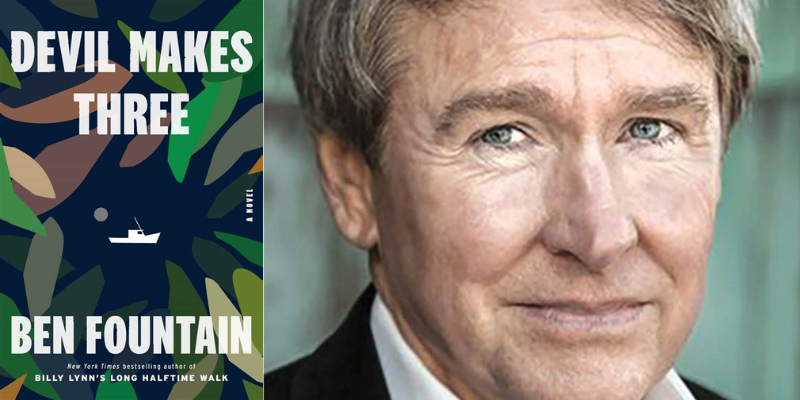
Ben Fountain on the Complexities of His New Novel
In Conversation with Mitzi Rapkin on the First Draft Podcast
First Draft: A Dialogue of Writing is a weekly show featuring in-depth interviews with fiction, nonfiction, essay writers, and poets, highlighting the voices of writers as they discuss their work, their craft, and the literary arts. Hosted by Mitzi Rapkin, First Draft celebrates creative writing and the individuals who are dedicated to bringing their carefully chosen words to print as well as the impact writers have on the world we live in.
In this episode, Mitzi talks to Ben Fountain about his new novel, Devil Makes Three.
Subscribe and download the episode, wherever you get your podcasts!
From the episode:
Mitzi Rapkin: I know this is a complicated question, but how did you do it? You have information in there and characters talking about literature, philosophy, politics, you’re trying to represent the CIA point of view, there’s a lot to explain about how complicated the history is in Haiti, where it’s going, who the different factions are on the ground now. And you also have to wrap this in a story where people want to turn the pages. So how did you hold this all in your head and then put it on the page?
Ben Fountain: Haiti is a complex place, and it seems to me all the complexities of the last 500 years, which are continuing to play out, today, literally, Haiti is the center of that, it’s ground zero for the last 500 years of how the world has gone. And it continues to play out in Haiti in this very direct and brutal way. And it’s complicated, it’s extremely complicated. And I felt like to write this book properly, I was going to have to do justice to the complexity of it. And yet, write a book that could be followed and understood. It might take a bit of energy. I mean, it might take a bit more mental energy than licking an ice cream cone. But you know, that’s the only way I could figure out to write the story. It is a bit of a challenging book to read. That’s fine with me. You know, all these things that you mentioned, yes, they are all at play in Haiti, and they were all at play in the coup years, you know, 1991 to 1994. And I tried to develop them, elucidate them, as best I could through the lives of the characters, instead of me, like slapping some kind of polemic on to a plotline. I thought, well, I’ve got these people, it feels like they have a lot of potential, their situations who they are. If I can write them properly, all these big things will take care of themselves. Like these things will naturally come to play in the story. And hopefully they’ll develop in a natural way, in a way that feels right. So, Misha, for instance, she’s a scholar of the Black Atlantic, so she’s going to see her experiences during these months, her family experience, or work in the hospital, her work doing these patient records, she’s viewing this all through the lens of her scholarship, the scholarship of the Black Atlantic, she can’t not do it. So, she’s going around thinking about Hegel, and the dialectic of history while she’s driving through traffic in downtown Port au Prince. To me, it seems natural. Of course, she would. But Haiti keeps her grounded. She’s trying to figure out what is going on. Why is this happening? You know, what confluence of forces and structures? What confluence of history, you know, has brought us to this point, this evil point? And so, she is actively engaged in trying to figure it out. You know, I hope it works. I tried my best. It was a heavy lift writing this book. I knew I would have to do things I didn’t know if I could do, whether I had the writing chops, whether I had the brainpower, but I thought well, I’m going to try, and it took me seven years.
***
Ben Fountain‘s work has received the Los Angeles Book Prize for Fiction, and a Whiting Writers Award, and has been a finalist for the National Book Award and runner-up for the Dayton Literary Peace Prize. His books include Brief Encounters with Che Guevara, which won the PEN/Hemingway Award and the Barnes & Noble Discover Award for Fiction, and the novel Billy Lynn’s Long Halftime Walk, winner of the National Book Critics’ Circle Award. His non-fiction book is Beautiful Country Burn Again. His latest novel is Devil Makes Three.
First Draft: A Dialogue on Writing
First Draft: A Dialogue on Writing is a literary podcast produced and hosted by Mitzi Rapkin. Each episode features an in-depth interview with a fiction, non-fiction, essay, or poetry writer. The show is equal parts investigation into the craft of writing and conversation about the topics of an author’s work.



















